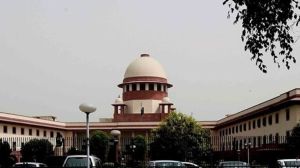US spells it out at last: Pak’s terrorism hurting India
NEW DELHI, MARCH 15: The Clinton Administration appears to be making some fundamental and far-reaching policy adjustments on South Asia on...

NEW DELHI, MARCH 15: The Clinton Administration appears to be making some fundamental and far-reaching policy adjustments on South Asia on the eve of the President’s visit to the sub-continent. This includes identifying Islamabad as a potential aggressor and asking it to back off from its confrontation with India; and warning Pakistan to cap terrorist activity that for the first time US has acknowledged is directed against India.
Washington’s refined position came in course of an address by Secretary of State Madeleine Albright — who is thought to have been not always sympathetic to Indian positions — in an address to the Asia Society.
Warning Pakistan to “respect” the cease-fire line in Kashmir and halt terrorism against India, Albright told a host of South Asia mavens that “nations must not attempt to change borders or zones of occupation through armed force… now that they have exploded nuclear devices. Tangible steps must be taken to respect the Line of Control.
Also for the first time, Washington acknowledged directly that the terrorism exported from the badlands of Pakistan and Afghanistan was hurting India, and instead of fudging the issue, directly asked Islamabad to stop it. “We want to see steps to address the effects of terror on Pakistan’s neighbors, notably India,” Albright said.
Sections of the US media and some officials interpreted Albright’s remarks as what one paper termed “a shift toward India and away from decades of US neutrality”. A senior US official was quoted as saying the remarks were aimed at Pakistan, which President Clinton will visit briefly towards the end of his trip starting this weekend. “Pakistan wants to change the border, not India,” the official said, adding, “There have been indications of increased Indian activity along the Line of Control, so this is a warning for both sides. But it is Pakistan rather than India that is seeking adjustments.”
Another senior administration official said “this is not a tilt towards India,” but a “recognition that we have many more opportunities with India and many more concerns with Pakistan”.
That was evident in Albright’s lengthy policy speech, some 90 per cent of which was devoted to India, including sustained panegyrics on the vigour and fortitude of Indian democracy and the sparkle of its knowledge-based economy. As much as Albright spoke of the vast potential for Indo-US relations, she was sharp and censorious about Pakistan’s military junta. She firmly rejected Gen. Musharraf’s contention to the Pakistani press that Mr Clinton’s visit was an endorsement of his government. “I want to leave no room for doubt,” she said. “In no way is this a decision to endorse the military coup led by Gen. Musharraf. And no one should interpret it as such.”
At the top of President Clinton’s agenda in Pakistan will be “avoiding the threat of conflict in South Asia,” followed by restoring democracy, fighting terrorism and preventing proliferation, she said. She also repeated the administration’s position that “The President is not going to mediate the Kashmir dispute… unless both sides ask.”
Albright also addressed at length the differences between India and the US on nuclear matters and said “our relationship today has the strength and breadth to keep working through our differences and find a way forward.”





- 01
- 02
- 03
- 04
- 05


























